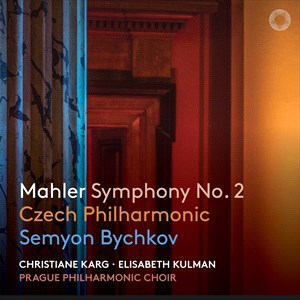

I must admit that I have a mixed bag of feelings and reactions to this new recording of the Symphony No. 2 in C Minor "Resurrection" by Gustav Mahler (1860-1911). Is it simply due to the fact that I so much enjoyed the previous recordings by the Czech Philharmonic and conductor Semyon Bychkov of the Symphony No. 4 and Symphony No. 5 that I was expecting too much this time around. After all, if there ever was an impressive symphonic edifice it's Mahler's "Resurrection" Symphony.
My main dissatisfaction with Semyon Bychkov's account lies mostly in the first movement. You see, if there ever was a symphony that requires a "big picture" approach, it's this one. And it seems that Bychkov tries very hard to overly manage the expressive sonic characteristics of each and every instrumental group within this movement that he overlooks the dramatic urgency at its core. The cellos and basses that open the movement sound utterly impressive, but they lack the biting incisiveness and emotive outcry that sets the tone for the whole movement, if not the whole symphony. And again, the cataclysmic event near the end of this movement sounds great, but lacks the ferociousness required to conjure up its impactful effect. Which is odd, because the moment of man's great anger near the end of the third movement is so devastating here that it will blow you hair back. I'm convinced that, like muzzling an angry dog, Bychkov overly restrains the emotive power of the first movement in favor of sonic quality.
On the other hand, the rest of the symphony fares much better. With the exception of alto Elisabeth Kulman's voice which lacks the required gravitas to do the "Urlicht" movement full justice, the second part of the symphony more than makes up for the first part's shortcomings. The off-stage brass couldn't sound any better as they truly project a sense of great distance. The brass choir at the 6:45 mark is richly stoic, and the first glimpse of heaven which follows is highly poignant and stirring. The revolt of the rising dead is breathtaking in its terrifying anger. The final birdsong set against the distant horns is impressive. And now for the magic .... when the choir first comes in with "Aufersteh'n, ja aufersteh'n wirst du" (Arise, yes, you shall rise again) they sound so hushed and distant, that they truly sound as if radiating from heaven, as they should (the last time I heard it done this well was in the old Otto Klemperer recording on EMI). And when soprano Christiane Karg first comes in, check your pulse if you don't get goosebumps. During the final three minutes or so, where the full Prague Philharmonic Choir, pipe organ and orchestra are going full power, you can't help but feel elation and rapture. Bychkov's tempo is exemplary here, as he brings the whole symphony to a triumphant conclusion.
The audio quality of the Pentatone recording has plenty of impact, and well captures and projects the scope of the forces involved. It's all a matter of subjective opinion but if like me, you find the first movement a bit underwhelming, let me just finish by saying that the rest of the performance makes up for it, and then some.
Jean-Yves Duperron - April 2023 Segment from final movement